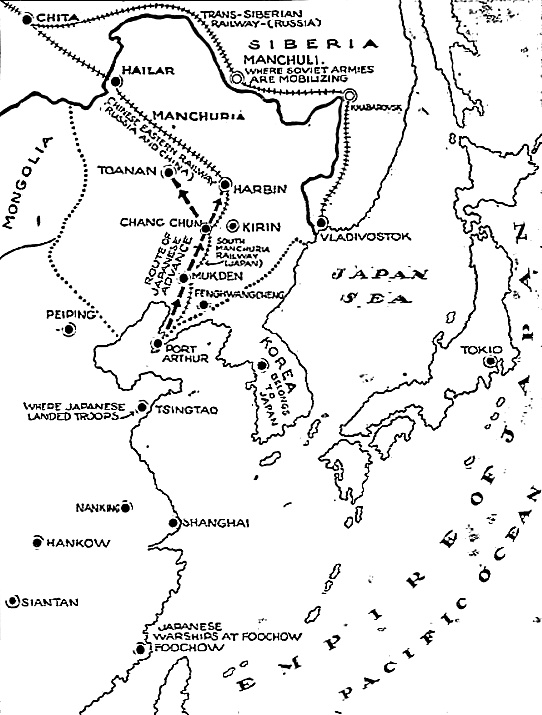The Pittsburgh Press (September 27, 1931)
Chinese flee ‘war’ zones
Thousands of destitute refugees escape from Manchurian front

PEIPING (UP, Sept. 26) – Thousands of refugees streamed into Peiping from the “war” zones of Manchuria today. Hundreds were destitute. They roamed the narrow streets of the ancient capital seeking shelter and food.
Railways and roads leading from Manchuria were filled with fleeing men, women and children. Renewed clashes were feared between Japanese and Chinese forces. Peasants and small shop owners deserted their stores and sought safety within the Great Wall of China.
Tense anti-Japanese feeling here was heightened by reports that Japanese Army planes had bombed three passenger trains south of Mukden. A communique from Chinese Army headquarters said Japanese airplanes flew low over the trains and opened fire with machine guns, endangering lives of non-combatants.
Marshal Chang Hsueh-Liang, youthful ruler of the three provinces in Manchuria, remained calm and refused to permit his men to resist.
The northeast arsenal outside Mukden was ablaze today, flames threatening to destroy the plant, one of the largest in the world.
Thousands of Chinese are employed in the arsenal, which turns out shells, mortars, field guns, bombs and other modern war equipment.
Simms: U.S. alarmed by war threat in Manchuria
By William Philip Simms, Scripps-Howard foreign editor
WASHINGTON (Sept. 26) – Washington and other world capitals are watching the Far East with grave apprehension, unrelieved by what, for the moment, appears to be signs of peace.
Three nations have locked horns over Manchuria, the cockpit of Asia, and another bloody conflict seems inevitable before the question of supremacy is finally settled.
China possesses the province, rich in farm lands and minerals, but Russia and Japan already have fought one war over it and today another is in prospect as China stubbornly opposes Japan’s encroachments.
Japan, holding all South Manchuria, is steadily pushing northward. The South Manchurian Railway is owned by the Japanese government. Other lines, also owned by Japan, branch out from it, and Japanese control goes with them.
With an angry frown, China is watching this process of penetration. She is convinced Japan intends to stay, and Japanese spokesmen admit that, having fought Russia for a foothold at a cost of 100,000 lives and a billion dollars, she will fight another to hold it.
It is merely a question of time before it comes to a head. China, growing stronger all the time, some day will attempt to oust Japan and Japan will resort to force to prevent being ousted.
Meanwhile, in Tokio, a strange conflict is taking place inside the Japanese government. by constitution the ministers of war and navy are responsible directly to the emperor, not to the premier. They represent the militarists of the country and advocate “strong hand” methods in China.
On the other hand. Premier Wakatsuki and Foreign Minister Shidehara want a policy of peaceful penetration and trade with China. These two factions are battling for the upper hand.
Beyond a doubt the present Japanese aggression in China violates the Kellogg pact, the nine-power treaty to respect China’s territorial integrity and other international obligations. But as it may have been committed by the military leaders without knowledge of the cabinet itself, the United States and the League of Nations prefer to wait to see if the situation will be clarified before resorting to strong language.
Japanese-American relations, moreover, have been delicate in recent years because Congress passed a law excluding Japanese immigrants. There is always a latent hostility in Japan against this country. A stiff note from Washington, while the Japanese cabinet is still fighting to see whether the policy is to be one of peace or war, might tip the scales in favor of the militarists.
Doubtless this situation has influenced both Geneva and Washington in dealing with the Manchurian crisis. There is much at stake. If the military faction wins out, the Kellogg pact, nine-power treaty and all the world’s efforts since the armistice to create an anti-war machine will go by the boards. Mankind will be right back where it was in 1914.
Russia, likewise, has its eyes on the Far East. With China she owns the Chinese Eastern Railway across Northern Manchuria and a spur running southward from Harbin to Chang Chun, where it connects with the Japanese line.
